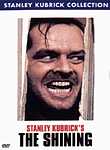
The Shining (1980)
dir. Stanley Kubrick
starring: Jack Nicholson, Shelley Duvall
genre: Horror
awards: AFI Winner
Under the question: What are some alternatives to staring at a blank page? I suggest that there is only one alternative to staring at a blank page and that is to write -- if you want to be a writer. And in the The Writer's Mentor Suggests section, Exercise #2, I write: "If your mind seems to freeze up during this exercise, try writing down words at random, not necessarily having anything to do with your topic at hand. Or jot down words placing them arbitrarily on your paper or screen (although, obviously this is quicker by hand on paper)." Someone who takes this idea to the ultimate extreme is Jack Torrance in The Shining, Stanley Kubrick's cinematic version of the Stephen King novel.
Jack (played by Jack Nicholson at his maniacal best) already seems on the brink and exhibits an edgy irritation with both his wife Wendy (Shelley Duvall) and his son Danny as they drive to their new winter job as caretakers of an isolated mountain resort, the Overlook Hotel, in the Colorado Rocky Mountains. There are hints of past problems (and portents of future ones) -- Jack may have been fired from his teaching position, he definitely has had a drinking problem, his relationship with his wife appears lethargic, because Danny clearly fears his father, we suspect Jack of physically abusing him, and, in addition, Jack has illusions of writing the Great American Novel. This does not bode well. But, perhaps, exorcising his demons on paper is exactly what he needs.
Under strict orders to remain quiet and stay clear of Jack when he is "working" in his enviable study -- the lodge's cavernous wood-paneled, picture-windowed lobby -- we see Wendy and Danny virtually walking around on tiptoe to appease him. There are sounds of a clacking typewriter and Wendy thinks that all is going splendidly with Jack's writing, until he begins to sleep through most days, remains in his robe and pajamas, stops shaving, and surpasses his level of perpetual cantankerousness -- all signs of depression and probably cabin fever, if not downright page fright.
Of course, since this is a Stephen King story, there must be an element of horror as part of the plot, but here we are only concerned with a far more gruesome nightmare that haunts many scribes -- that of a failed writer who's going off the deep end.
The story offers us vague possibilities. Are there really ghosts in room 237? Are Danny's visions of the past or the future? Is Jack a reincarnation of an axe-murderer? Is all this happening in Jack's imagination -- and if only he could write it down it would disappear? Is Wendy enough to push Jack (or anyone else for that matter) over the edge? Are Jack's financial and familial responsibilities driving him to the brink? Or is page fright the true culprit here, the roadway to madness?
Before Jack does his Ed McMahon imitation in the devilishly funny, yet hair-raising, "Heeer's Johnny!" scene, Wendy stealthily has made her way over to his now silent typewriter (while he is probably looking for a weapon with which to murder her). It would appear that Jack has actually completed a manuscript of several hundred pages, until she looks more closely, and, in disbelief, she sees that he has repeatedly written, ad infinitum, the children's verse: "All work and no play make Jack a dull boy."
So, like I said before, if your mind freezes up, write down words at random that may not necessarily have anything to do with your topic at hand. I guess, "All work and no play make Jack a dull boy," is as good a place as any to begin.
|
